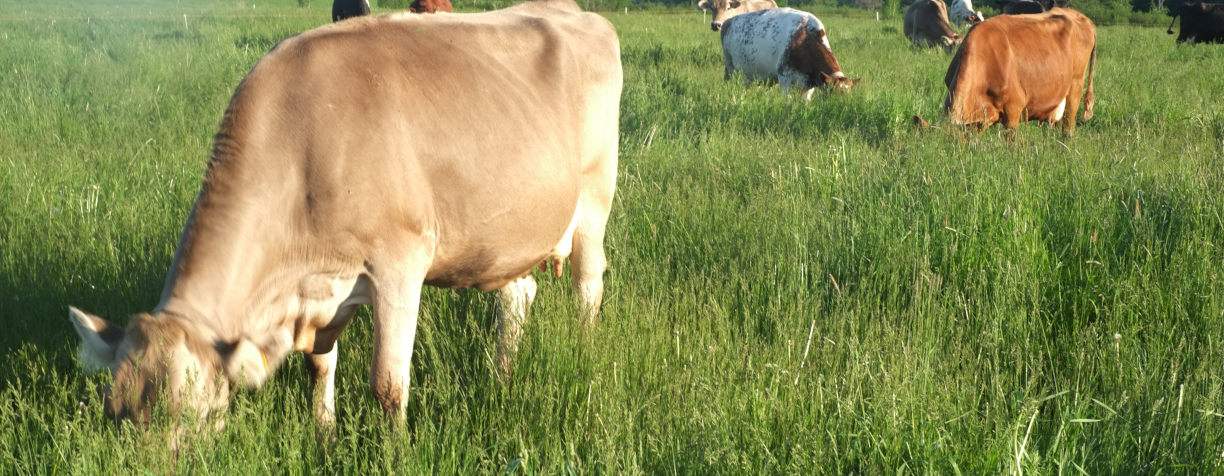By Kathy Voth
On Pasture
For centuries, skilled trades have used apprenticeships to train the next generation and ensure that everyone meets standards that are good for the trade and good for the customers being served. Now Dairy Grazing Apprenticeship is using this model to help new farmers entering the world of dairy production, and to support established farmers as they work with the next generation of producers.
Here’s how the program works:
The apprenticeship consists of 4,000 hours of training over a period of two years. Of these hours, 3712 are paid employment and mentoring under an approved Master Dairy Grazier. A comprehensive DGA Training Manual (or “Job Book”) lays out the competencies that must be met in order to own and operate a managed-grazing dairy farm, providing a blueprint for the mentoring process.
The other 288 hours are related instruction to enhance on-farm training. The apprentice is responsible for about $1,000 in tuition which includes:
• Courses in pasture management; milk quality; herd health; dairy nutrition; and soils, nutrients and composting,
• Peer discussion groups, pasture walks, farming conferences and networking opportunities
• Holistic Management and professional development training
Each Master-Apprentice pair is assigned a local Education Coordinator, who monitors the mentoring relationship and provides educational support and on-farm technical services. Apprentices not only gain skills, knowledge, and experience but also develop relationships with Apprentices and Masters in their cohort as well as with other dairy farmers, agricultural professionals, and service providers in the local community.
Apprentices graduate to certified Journey Dairy Grazier status, receive additional support services as they advance in their career, and have the option of eventually becoming Masters and taking on Apprentices themselves in this unique farmer training program.
DGA provides financial advising for Apprentices and Masters. Opportunities are available to Journey Dairy Graziers to advance into management, equity earning, farm start-up or farm transfer. DGA is an approved vendor for Farm Services Agency.
Mentors And Communities Benefit Too
Participating Master Dairy Graziers make a difference in the life of an individual or family looking at dairying as their future, while also making a difference for their own operations. First, they are developing a skilled employee with the potential for joining the operation as a manager or partner. Then, as part of the structured Apprenticeship program, participating farms receive professional financial analysis and business planning support and help exploring new models of investment, equity building and farm transfer.
Each cow in a dairy herd generates about $20,000 in economic activity in the local community every year, making dairying an important part of rural economies. But since 1970 the number of American dairy farms has dropped from 640,000 to under 60,000 today. Dairy Grazing Apprenticeship is helping rural communities through this apprenticeship program by supporting new and beginning farmers entering the industry, and helping older farmers successfully transfer their operations to the next generation.
The program began in 2010 as an initiative of GrassWorks, Inc. and the Wisconsin Department of Workforce Development with support from the USDA’s Beginning Farmer and Rancher Development program. Now an independent 501(c)3, it has expanded to become a National Apprenticeship under the U.S. Department of Labor – Employment and Training Administration. Currently, DGA has 88 approved Master Dairy Graziers and 32 Apprentices in eights states: Wisconsin, Minnesota, Iowa, Missouri, New York, Pennsylvania, Maine and Vermont.
If you’d like to get started right away, visit the DGA website. And stay tuned here as well. We’ll be sharing some of the DGA case studies and their successes in coming issues of On Pasture.
Last but not least, this is a great example of folks coming together to provide new people with gateways to careers in agriculture and avenues for experienced farmers to pass on their knowledge and maybe their operations. We hope it inspires you.


